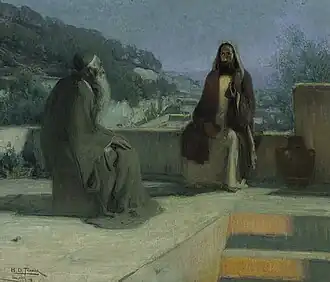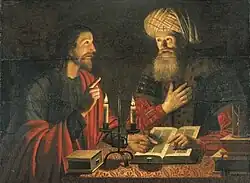Nicodemus


Nicodemus is a New Testament figure venerated as a saint in a number of Christian traditions. He is depicted as a Pharisee and a member of the Sanhedrin who is drawn to hear Jesus's teachings. Like Lazarus, Nicodemus is not mentioned in the synoptic Gospels, but only by John, who devotes more than half of Chapter 3 of his gospel and a few verses of Chapter 7 to Nicodemus, and last mentions him in Chapter 19.
Both Catholic and Eastern Orthodox Church traditions consider Nicodemus to have secretly been a disciple of Jesus on the basis of John 19; there is no explicit mention of his discipleship in the Gospel of John. Owing to his insistence on a hearing for Jesus according to Jewish law, Nicodemus is sometimes called "defender of Jesus".
Quotes
Gospel of John
- This man came to Jesus by night and said to Him, “Rabbi, we know that You are a teacher come from God; for no one can do these signs that You do unless God is with him.
- John 3,2 (NKJV).
- [In response to Jesus' words: "Most assuredly, I say to you, unless one is born again, he cannot see the kingdom of God."] Nicodemus said to Him, "How can a man be born when he is old? Can he enter a second time into his mother’s womb and be born?"
- John 3,4 (NKJV).
- [To the Pharisees who wanted to arrest Jesus] Does our law judge a man before it hears him and knows what he is doing?
- John 7,51 (NKJV).
Quotes about Nicodemus
- There was a man of the Pharisees named Nicodemus, a ruler of the Jews. This man came to Jesus [...] Jesus answered and said to him, “Are you the teacher of Israel, and do not know these things? 11 Most assuredly, I say to you, We speak what We know and testify what We have seen, and you do not receive Our witness. 12 If I have told you earthly things and you do not believe, how will you believe if I tell you heavenly things?
- John 3,1-2;10-12 (NKJV).
- Christ gives us a definite picture of the entire process in His own life story, built around those major initiations which are our universal heritage and the glorious (and for many) the immediate opportunity. These are: 1. The Birth at Bethlehem, to which Christ called Nicodemus, saying, "Except a man be born again, he cannot see the kingdom of God."... 2. The Baptism in Jordan. This is the baptism to which John the Baptist referred us, telling us that the baptism of the Holy Spirit and of fire must be administered to us by Christ... 3. The Transfiguration. There perfection is for the first time demonstrated, and there the divine possibility of such perfection is proven to the disciples. The command goes forth to us, "Be ye therefore perfect even as your Father which is in heaven is perfect."... 4. The Crucifixion. This is called the Great Renunciation, in the Orient, with its lesson of sacrifice and its call to the death of the lower nature. This was the lesson which St. Paul knew and the goal towards which he strove. "I die daily," he said, for only in the practice of death daily undergone can the final Death be met and endured."... 5. The Resurrection and Ascension, the final triumph which enables the initiate to sing and to know the meaning of the words: "Oh death, where is thy sting? Oh grave, where is thy victory?"... Such are the five great dramatic events of the mysteries...
- Alice Bailey, From Bethlehem to Calvary (1937). Chapter One
External links
{[Wikipedia}}